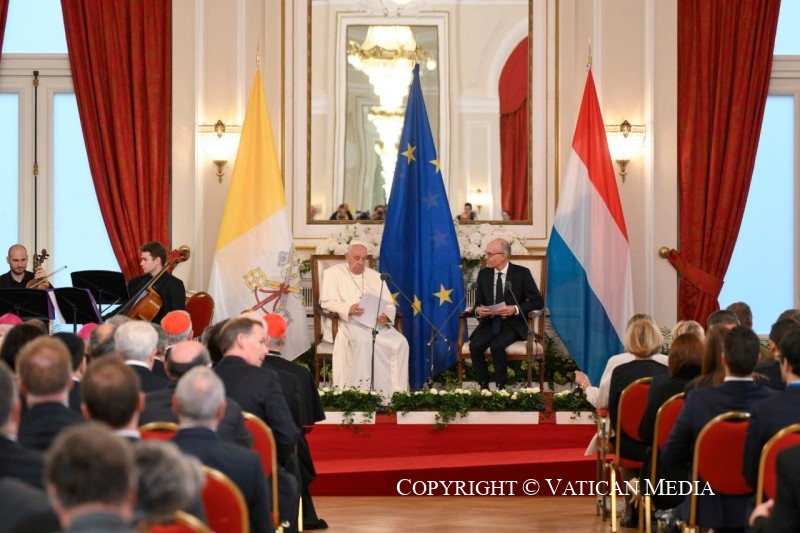Pope in Luxembourg: ‘Wealth includes responsibility'
The pontiff pleads on behalf of the most disadvantaged nations in his address to the authorities of the Grand Duchy, the first stage of his latest journey that will also take him to Belgium. At the bottom of the wars that are once again shedding blood in Europe is the inability to raise “our gaze upwards”. The Gospel of Jesus is a “force of personal and social renewal”. Small countries on borderlands show the “needs of a new era of peace”.
Luxembourg (AsiaNews) – Pope Francis arrived in Luxembourg today, first leg of his latest apostolic journey that will end on Sunday in Belgium, two countries that are the central to Europe, and not only geographically.
In his address to the authorities, civil society groups, and the diplomatic corps, the pontiff said that, “Wealth includes responsibility. I ask for constant vigilance so that the most disadvantaged nations may be helped to rise from their impoverished conditions.”
A small country in the Old Continent, the Gran Duchy of Luxembourg has one of the highest per capita incomes. A founding member of the European Union and its predecessors, it is home to several European institutions, including the Court of Justice of the European Union, the European Court of Auditors, and the European Investment Bank.
"This is always done with peace," the pontiff said. “Let us not forget that war is always a defeat. Peace is necessary. It is very sad that today the investments that give the most income in a European country are those in arms factories.”
It is precisely from Luxembourg’s geographic uniqueness, on the border of different linguistic and cultural areas, that Pope Francis draws a broader message for the whole world.
“When the logic of confrontation and violent opposition prevails, the places that are on the border between warring powers end up being – despite themselves – heavily involved.
“When, on the other hand, minds finally find ways of wisdom, and replace opposition with cooperation, then these same places become the most suitable to show the needs of a new era of peace and the paths to follow.”
It is not "the size of the territory or the number of inhabitants that is the indispensable condition for a state to play an important part on the international level, or for it to become a nerve centre at the economic and financial levels."
Rather, this is achieved by “the patient building of wise institutions and laws, which, by regulating the lives of citizens according to criteria of equity and respect for the rule of law, place the person and the common good at the centre, preventing and countering the dangers of discrimination and exclusion.
“Luxembourg is a country with open doors, a beautiful testimony of non-discrimination and non-exclusion.” But this testimony needs to be reaffirmed in the context of today's Europe. "To be authentic and integral," Francis warns, "development must not plunder nor degrade our common home and must not leave peoples or social groups on the margins: everyone, all brothers and sisters."
Turning to new cleavages that have developed on the European continent, Francis lamented the “ fractures and enmities which, instead of being resolved on the basis of mutual good will, negotiations, and diplomatic work, lead to open hostilities, with their sequel of destruction and death. It seems that the human heart does not always know how to preserve memory and periodically gets lost and returns to the tragic paths of war. We forget that.”
He calls this a “dangerous sclerosis, which makes nations seriously ill and increases conflicts and risks, pushing them towards adventures that have huge human costs, repeating useless massacres.”
This disease, the pope explains, can be overcome by returning to "raising our gaze upwards. It is necessary that the daily life of peoples and their rulers be moved by high and deep spiritual values.”
"As the Successor of the Apostle Peter," he said, "in the name of the Church, I am also sent here to bear witness that this lifeblood, this ever-new force of personal and social renewal is the Gospel of Jesus Christ."
Only its power "can profoundly transform the human soul, making it capable of doing good, even in the most difficult situations, extinguishing hatred and reconciling the parties in conflict.
“May everyone, every man and every woman, in complete freedom, know the Gospel of Jesus, who has reconciled God and man in His Person and who, knowing what is in the human heart, can heal their wounds.”
Hence, the pontiff urges Luxembourg to "show everyone the advantages of peace compared to the horrors of war, of integration and promotion of migrants rather than their segregation, the benefits of cooperation between nations in the face of the harmful consequences of the hardening of positions and selfish and short-sighted or even violent pursuit of one's own interests.”
Hither too, the pope warns of the impact of the demographic winter: "I have seen the percentage of births: please, more children, more children. They are the future."
Finally, Pope Francis cited the motto "To serve", chosen for this trip. "It refers directly and eminently to the mission of the Church," he explained.
"But allow me to remind you that service is also, for each of you, a high title of nobility, the main task, the style to be assumed every day. May the good Lord grant you, to always do so, with a joyful and generous heart. And let those who have no faith work for their brothers and sisters, work for their country, work for society. This is a path for everyone, always for the common good.”
11/08/2017 20:05







.png)










